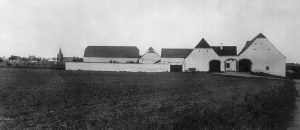The Courtyard Farm in Ragnies
With origins dating back to the 13th century, this vast complex marks out its imposing silhouette in the Ragnies region and, since 2004, has been home to the famous Biercée Distillery.

With origins dating back to the 13th century, this vast complex marks out its imposing silhouette in the Ragnies region and, since 2004, has been home to the famous Biercée Distillery.

The land of Ragnies was owned by the abbey of Lobbes for more than nine centuries. If the size of the ‘Ferme de la Cour’ testifies to the hold of its masters on the territory, its name also evokes the presence of a court of justice on these premises.
Two wings of 18th century barns enclose the entrance porch to the farmyard. The west wing is composed of a succession of stables, while the wing is reserved for the storage of agricultural goods. A 17th-century main building is attached to the courtyard. The north-west tower dates from the 13th century. A second courtyard gives access to the tithe barn, where rents and taxes owed to the abbey by the neighbouring censes and farms were collected and stored.
In 2004, the Biercée Distillery underwent a thorough restructuring. A large part of the buildings and production premises are accessible to visitors, allowing them to discover the current activity carefully established in the old volumes.
While the Ferraris map indicates the presence of an orchard surrounding the farm in the 18th century, the current landscaping is the work of the landscape architect Jacques Wirtz.
For more information, see our heritage sheet.
FERME DE LA COUR
Rue de la Roquette, 36 – 6532 Ragnies
MAISON DU TOURISME PAYS DES LACS
Route de la Plate Taille, 99
6440 Boussu-lez-Walcourt
+32(0)71/14 34 83
OFFICE DU TOURISME DE THUIN
Place Albert Ier, 2 – 6530 Thuin
+32(0)71/59 54 54
The association Les Plus Beaux Villages de Wallonie (The Most Beautiful Villages of Wallonia) oversees a network of 32 villages, bearers of a strong territorial identity and reflecting traditional architecture. It is committed to promoting the rural, cultural and natural heritage of Wallonia and is a part of the development of local and responsible tourism.
More information